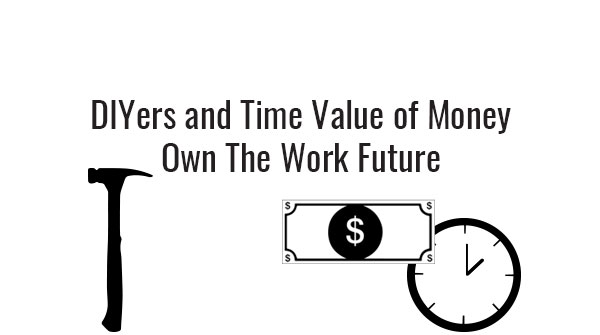Essentially, it’s not great to do everything yourself because your time is limited. But in order to understand the future of work you need to understand both how to do a lot more things DIY, specifically around big ticket/high value items, while also understanding the time value of money and its impact on your time, resources, and ability to add value and to create cash flow and income in unique ways such as by reducing expenses and increasing the value of assets through sweat equity.
What is the Time Value of Money?
The concept of time value of money is literally that time is money. Meaning, what you do for work, has a cost value associated with it. You should understand the value of your time in relation to its value in dollars. For me, I know my going rate for digital marketing services. I also have a value of time worth it to me regarding homes I want to buy or assets I believe I can create value or demand out of through sweat equity.
What is Sweat Equity?
Sweat equity is the concept that you can create value through your work. You cannot realize your equity in an asset until you sell it. So, essentially, by using ’sweat equity’ you are increasing the value of something physical or tangible that others might want to buy now or in the future..
Present Value vs Future Value of Money
The second part to fully understanding the time value of money is present value versus the future value. This is typically applied to benefits to receiving money now rather than receiving an identical sum later. So, for example, if you had bought a house in 2015 in Dallas rather than buying one in 2020, your home price for the same house in the same condition would have been a lot lower. Value, therefore, is often a perceived value more than anything else and of course has many factors all centered around what the market demands.
Go Deeper By Combining the Time Value of Money and DIY
The concept of time value of money must be combined with the DIYer perspective to encompass a much broader range of your life. It is important to consider that there is a diminishing marginal returns when it comes to your personal sweat equity and what you can turn into value today versus tomorrow.
The time value of money should in reality be the time value of benefit or the time value of assets when it comes to business and work. This is because money is beneficial only when you can exchange it for something. Assets are just as good because you can use it to exchange with something else.
We often think of our income as coming from our job but we should consider our ability to earn money much broadly than our profession. We must consider what we own and how we spend our time as an opportunity to minimize expenses and debt today and increase recurring or future cash flow for tomorrow. Many can and should consider personal investment ideas as monetary benefit and potential income now.
Even more so, in the future of business, we will not depend on the security and stability we used to expect from day jobs alone (or pensions or retirement). We will work throughout our living years and past the age of 65. Therefore, we need to manage our own time value of work and how much work we do now knowing that at some point we will want to transition the nature of our work to more management than physical sweat equity to create value or the time required to find investments to negotiate or acquire.
It is important that in your prime working years you put in the effort to learn, work, and get educated in how to manage and invest your money in the right places. This will set up the proper transition into retirement. This requires planning and preparation for your future, 5, 10, 20, and 50 years from now.
DIY Generalist
Most of the time, you can do 80% of learning how to do something on your own with the help of YouTube. You can become a generalist in a specific skill or craft with an investment in time. Being a generalist can really give you a leg up in the world of negotiations and cost management. Buying homes, cars, investing money, doing renovations or repairs on cars, items or homes are all good areas to become a generalist. Generally having a ‘can do’ attitude gets you a long way these days. Having knowledge of what something takes to accomplish allows you to know when someone or something is overpriced. And this is more than 80% of managing your costs – finding ways to learn what the true value of someone else’s time is rather than the inflated price in secret.
A Digital ‘Learning’ DIYer
Even more so, in the digital landscape, you can learn anything, and everything is immaterial. It’s just a matter of how much time you have to invest in doing whatever thing it is you want to do. For example, you don’t need to go to college, you just need to have wifi and a computer to learn. This concept of the immaterial functioning like a resource is about to get much more important.
Digital work has become more essential with COVID and other cultural changes in how we do work and its impact of how we buy goods and services. All businesses and people understand its imperative place in our culture and society now, more than ever. And yet who is doing anything about it?
We have already begun the massive shift in work economies. There are more and more work from home opportunities, especially for the digital marketer, writer, or other creative disciplines. Time in the corporate office is wasted time.
The Work Future Belongs to Creative DIYers
The future belongs to creative do it yourselfers. Companies now can’t afford to micromanage your time and some are learning that and giving you the freedom to work from home. They will expect good results but you will more and more have your time back to self-manage. This is the way of the future:
- Learning to live and work with complete personal autonomy/responsibility
- Project based contract/consulting work as needs arise
- A soon to be mass exodus from the big brother ‘micromanaging’ company to the collaborative consultant work environment
These things mean that change is coming if not already here. At the same time, there are new opportunities. Your job, particularly those 15 – 35, is to consider opportunities you have to grow and learn where you should invest your time, money, and resources. And while you invest in your profession, at minimum, you should become a generalist at personal budgeting and investing, buying and selling houses, and renovating and managing houses. Any common categories that everyone needs is a great opportunity: things like cars, food, or shelter are great areas to grow your time value of assets.
As a reminder, I always recommend starting with eliminating or minimizing unnecessary expenses, i.e. debt first. There is plenty of info on this already. But what isn’t talked about as much is considering your personal assets. Consider the big purchases for most individuals: houses, marriages, cars, etc. Get good at money management and savings and as you do, look at ways to learn in the big purchase categories. These are the areas that everyone can benefit from being a generalist to a partial specialist either for yourself personally finding good deals or even creating value and selling them on the side, or as a profession. The more education you can get on these categories and the more you can learn to do-it-yourself, the more you can save on sunk costs – i.e. expenses that are not value oriented. This will put you in a better position in the long run as we embrace a culture that begins to work through retirement or to make a way so you can choose your work or manage investments as you get older.

